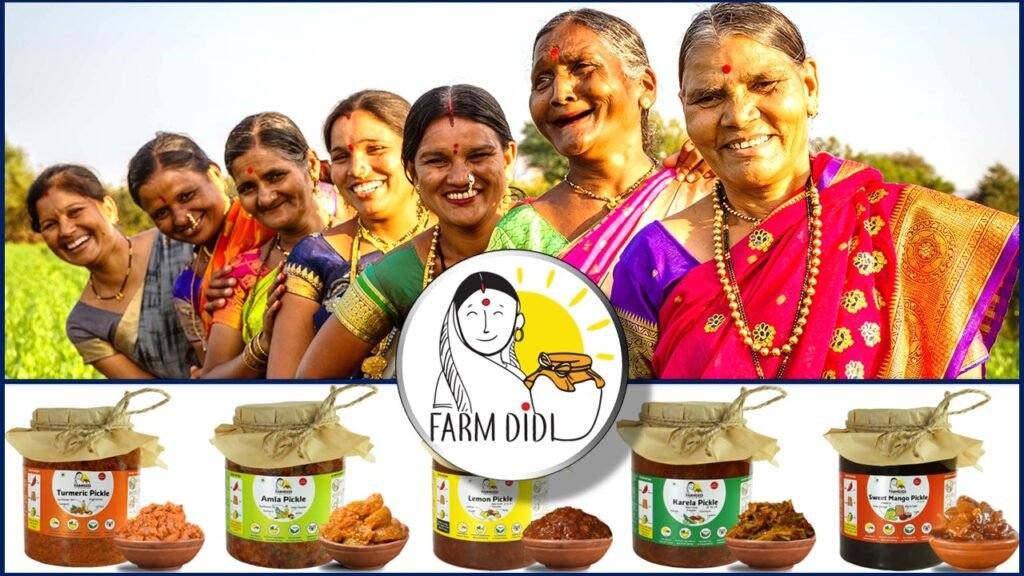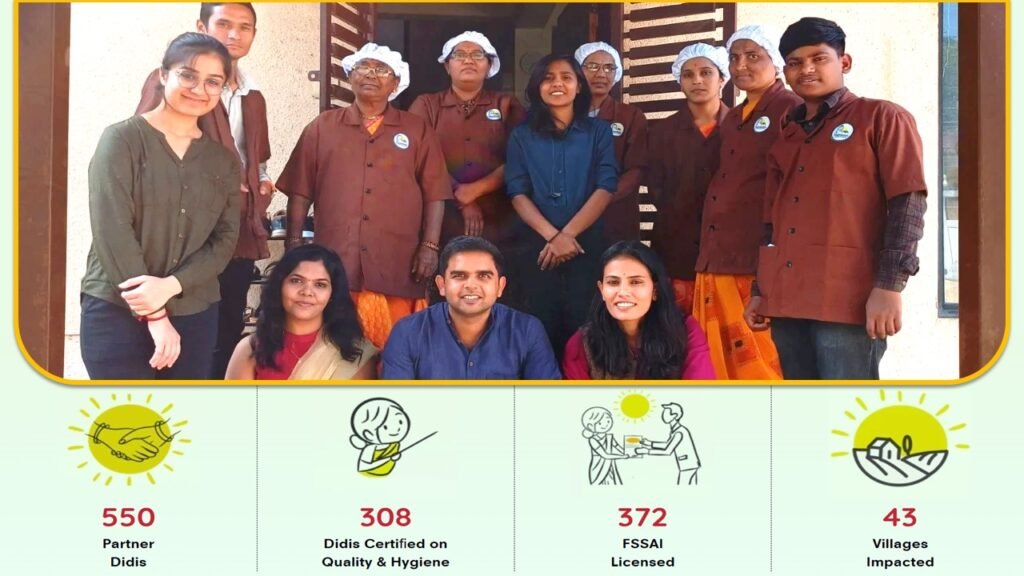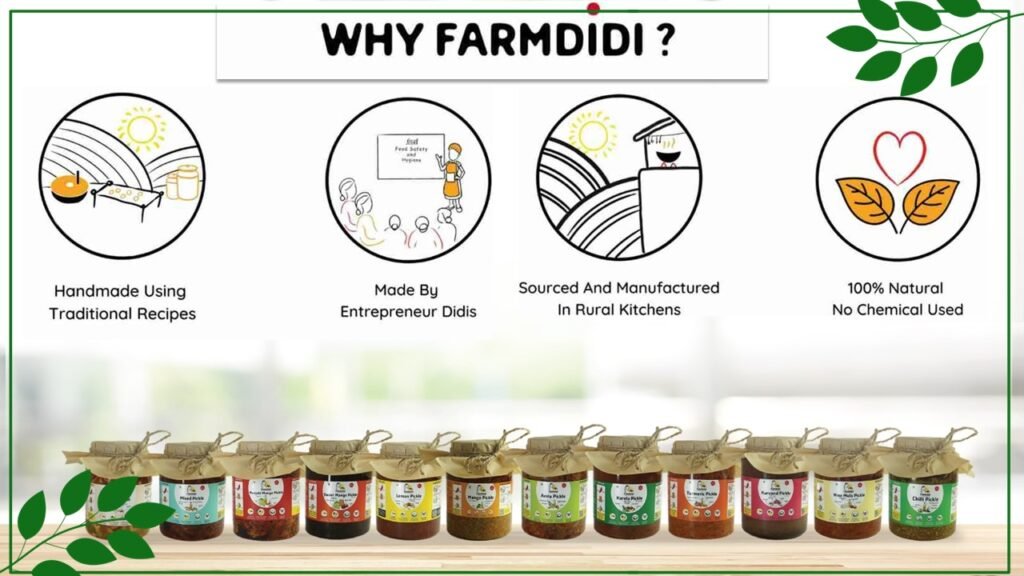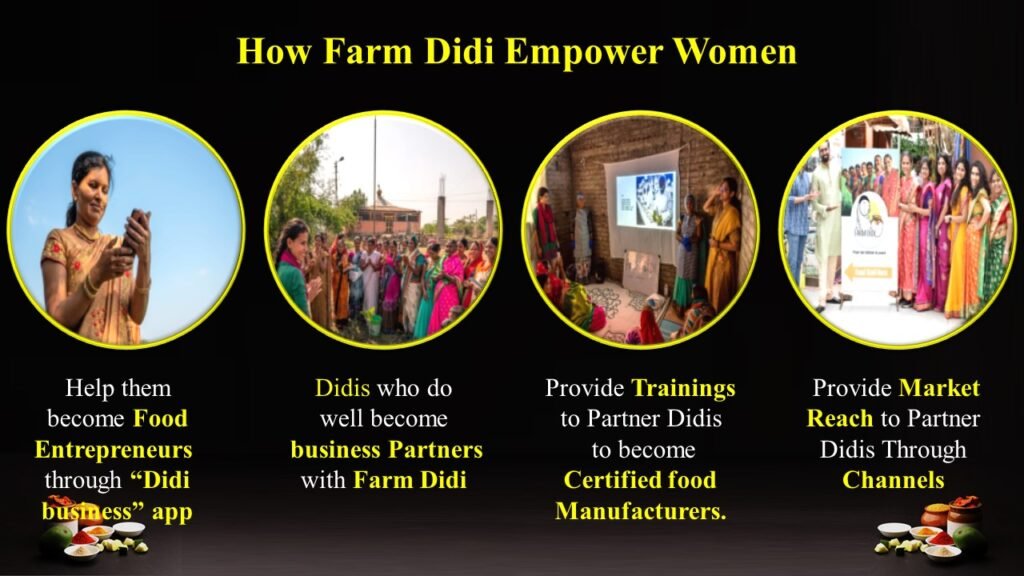‘Didi hum aur kya kar sakte hai?’ (Sister, what more can we do?) was a simple yet thought-provoking query asked by a few women in the rural areas of Bihar to Manjari Sharma, an IIM Calcutta student at that time. Little did Manjari know at the time that this question would inspire her to leave her high-paying job in the future and start something on her own that would empower rural women in India and later would get featured in Shark Tank India Season 3.
On the third season of Shark Tank India, Manjari Sharma and her crew made a business pitch to the Sharks. Their story of quitting their jobs and pursuing an ambition to empower 1 million rural women impressed every shark. But in Shark Tank, impressing the Sharks is not your sole goal. Aspiring entrepreneurs go there to seek funding to scale their businesses.
So, did Manjari Sharma and her Farm Didi crew get the funding they asked for? Keep reading to find out.
About FarmDiDi Business
The tagline in the FarmDidi reads ‘From her kitchen to yours’. The phrase represents their work in the easiest of ways. FarmDidi is a for-profit social food tech startup that partners with SHGs (Self Help Groups) and NGOs (Non-Governmental Organizations) to provide 100% natural homemade pickles, pappads, and chutneys to consumers in India and Abroad.
The company was started in 2021 by Manjari Sharma, a highly motivated former management consultant, and IIM Calcutta Alumnus. The company’s headquarters is in Pune, Maharashtra, and works with 150 SHGs in Maharashtra.
The company aims to provide 100% natural, healthy, homemade, and preservative-free food products to consumers by empowering 1 million rural women. They aim to spur nostalgic emotions in consumers by providing food items that taste and feel like those made by their mothers and grandmothers when they were young.
Overview
| Business name | FarmDidi |
| Starting year | 2021 |
| Ownership | Private |
| Founder | Manjari Sharma |
| Headquarters | Pune, Maharashtra |
| Core Team | Manjari Sharma (Founder) Kavya Paneer Selvham (VP- Supply and Quality) Asmita Ghodeshwar (CTO/ Co-Founder) Anukrit Johari (Sales and Operations Head) |
| Number of Employees | 11 to 50 |
| Industries | E-commerce, Food and Beverages, Food Processing, and Retail |
| Company Type | For-profit social enterprise |
| Products | Produces 20+ Self Keeping Units (SKUs) including multiple varieties of pickles (Mango pickles, Mix Pickles, Lemon Pickles, etc.), pappads, and chutneys |

Farm Didi Founder: A True Inspiration
Manjari Sharma founded FarmDidi in 2021, but the seeds for this revolution were planted much before in 2015-16. The story so far has been nothing short of inspirational and It can motivate people like you and me to come up with new ideas and innovations for the upliftment of the rural people of India, especially women.
Manjari’s Background, Schooling, and Education
Manjari was born in a small town in Bahadurgarh in the state of Haryana. The Bahadurgarh region is known for its high rate of female foeticides. Manjari’s grandfather was a very socially active person, always mentoring students and helping the community. Growing up seeing her grandfather, Manjari developed a passion for social service and always dreamt of doing something for society. Manjari’s parents motivated her to choose what is right between money, heart, and respect.
Manjari completed her schooling at Bal Bharati School, and after that, she joined Ramjas College, a college at Delhi University, for a Bachelor’s in Mathematics in 2005. Parallel to her studies, she used to teach mathematics and science to 50+ school children. After graduating, she worked at Wipro for two years. While working also, she continued taking classes for students.
After that, she decided to do a Masters in Business Administration. She was admitted to the Indian Institute of Management Calcutta (IIM C), one of the top 3 Business schools in the country. She was a member of the IIM Calcutta Sports Council and the Badminton captain of the institute. She was a member of Basketball, Futsal, and Cricket teams. She was also the events head of Club Syscon and TedxIIMC. For her exceptional performance in her batch, she received the Monalisa Award, a recognition given to the best all-round performer of a batch.
The Bihar Project: The Impetus
It was during this time (2015) that the Government of Bihar decided to launch a research paper competition entitled ‘Badh Chala Bihar’ where the Chief Minister’s Office in Bihar invited students across India to participate and research on key development areas such as education, health, law and order, agriculture, and women empowerment. Manjari and her team from IIM Calcutta decided to participate. They spent 15 days traveling through 3 districts (Begusarai, Khagaria, and Patna) and visited numerous villages in the state.
She witnessed the huge feminization in the agricultural sector. The reason was simple. Agriculture in India is not a very rewarding profession. So the men who worked in the fields migrated to other states of India to work in the cities as daily wage laborers. The women who remained in the villages had to look after the fields, and the animals and do household chores. It was rare in the villages of India that were historically patriarchal.

The women in SHGs were already doing what they could with limited resources and trying to earn a good income to support their families. Manjari conducted meetings with these SHGs trying to find the challenges and how her team could resolve them. The women were swiftly taking action based on the meetings. Manjari was happy that she got to experience closely rural women’s empowerment and did what she could to help them. But that was not all.
Didi hum aur kya kar sakte hai?
Wherever she went, one question was repeatedly being asked by women. ‘Didi hum aur kya kar sakta hai?’ (sister, what more can we do?). Another interesting aspect was that when women earn, they contribute 90% of their income to their family whereas men only contribute 35% on average. So, increasing the incomes of women meant a better standard of living for their families and thus contributed to the overall development of the rural sector. She wished to do something more for them.
Post MBA, she was placed as a management consultant at AT Kearney, a leading global consultancy firm. She was getting 5 figure salaries per month and was traveling around the world advising CXOs of various companies across the Banking, Fin-tech, Telecom, Oil & Gas, Healthcare, Government, and E-commerce sectors.

Even as she was excelling in the field, she was not satisfied. ‘Didi hum aur kya kar sakte hai?’ still lingered in her mind. She could not forget those hardworking women and the desire to do something for them grew each day. She understood that there was a lot of potential waiting to be tapped especially in the northern states.
Farm Didi: The Beginning
During the migrant crisis that occurred as a consequence of the lockdown, Manjari decided to go for it. She decided to go with the food business as 80% of rural women understand the food business. As a woman who understands Marathi well, she decided to start the business in Maharashtra.
Finally, after working for 4.5 years as a management consultant, Manjary Sharma quit her high-paying job and began Farm Didi in 2021 intending to empower 1 million rural women and supply quality homemade food to the people.
Also Read
- Top 24 Agriculture Startups in India
- Jugadu Kamlesh innovative Ideas to help Farmers – Shark Tank Featured
Farm Didi Business Model
Initially, Manjari started a D2C online platform called Didi Business where the producers (women of SHGs) could sell their products. In the initial phase, there was participation of 100 SHGs and this ensured consistent abundant supply. Manjari even managed to set up B2B giants like Horeca players to buy their products. But there were problems.
The products being made had quality issues, there were hygiene issues with production facilities and a lack of proper infrastructure. On the other hand, the SHGs were being manipulated by the B2B buyers by not paying on time and disrespecting the workers. The buyers gave more emphasis to low cost rather than quality.
Manjari decided that training the women was essential. She decided to conduct a mini-MBA type training for the women, teaching them about product management, supply chains, markets, ethics, and other business aspects. Proper training on Hygiene and food safety was also given.
The process
The business model is simple. Primarily, Farm Didi identifies partner SHGs with the help of NGOs. Then they give proper training to the women. Then the raw materials for production will be provided by Farm Didi through distribution partners and retailers to the SHGs. The Didis then make 100% natural, safe, healthy, and preservative-free pickles, pappads, chutneys, and other traditional products in a community kitchen. These products are then collected through logistics partners and delivered to a warehouse in Pune. After packaging and labeling, the products are sold through Amazon, Flipkart, and Farm Didi’s site.

So basically what FarmDidi does is help SHGs to improve their income by creating an efficient marketing and supply channel along with providing proper training on safety, hygiene, and business fundamentals. FarmDidi currently is a family of 150+ parter SHGs consisting of 1800 rural women across 80 villages in Maharashtra.
Farm Didi Funding
FarmDidi is a privately funded food tech startup. The company was started mainly with money from the personal finances of the founders. Over the years they have only been able to attain very little funding from very few angel investors. Manjari plans to partner with banks so that the SHGs can get easy access to credits so they can scale up their business. But their Shark Tank pitch proved helpful in the case of funding.
After their successful pitch on Shark Tank India Season 3, FarmDidi acquired a total funding of ₹1 crore from Vineeta Singh and Peyush Bansal.
This amount would be a big help to Farm Didi to expand their operations and would take them 1 step further to their ultimate dream of empowering 1 million rural women.
As of now, the company’s major funding sources are – Bootstrapping, Angel Investments, and Sharks. The summary of Farm Didi funding is shown below.
| Segment | Value |
| Total valuation (according to the founders) | ₹ 25 crore |
| Angel Investors ( mainly IIM Calcutta Angels) | ₹1.33 crore |
| Sharks (Vineeta Singh and Peyush Bansal) | ₹1 crore |
| Bootstrapping | The rest of the amount |
| Total amount raised | ₹ 1.76 crore |
As you can see angel investments and bootstrapping were the major funding sources of Farm Didi in the initial years. The angel investments were mainly from IIM Calcutta alumni. Now, the Shark funding will give them that extra push.
Awards and Recognitions
Farm Didi was recognized as the United Nations Small and Medium Enterprises Champion by the United Nations Developmental Program (UNDP). The company received recognition from Shark Tank India and got a chance to pitch its business idea in Shark Tank Season 3. The firm was also listed among the top 500 Challenger Brands by Your Story. Other major recognitions were from
- Wharton India Economic Forum
- Outstanding Women Leadership
- Ministry of Science and Technology
- Google for India
- Zone startups
- 91 Springboard
FarmDidi Shark Tank
2 years after its inception, Farm Didi finally got an opportunity to be in Shark Tank India. Shark Tank India is an Indian reality show where aspiring entrepreneurs pitch their business ideas in front of judges (known as Sharks in the show) who have already proved themselves by creating unicorns in the Indian Business space. The aspiring entrepreneurs pitch their business ideas in the hope of securing investment from the Sharks. The Sharks analyze the ideas and decide whether to invest in them or not.
The Highlights of the Pitch
The Farm Didi Shark Tank India business pitch was done by Chief Didi Manjari Sharma and co-founders Anukrit Johari and Asmita Ghodeshwar. Three of them were very confident and presented as if their lives and the lives of 1800+ Didis depended on the pitch.
The pitch started with the founder’s story of how the idea of Farm Didi was born and how it is currently empowering thousands of rural women. The sharks (Aman Gupta, Anupam Mittal, Namita Thapar, Peyush Goyal, and Vineeta Singh) were all impressed by the Farm Didi Story and congratulated Manjari and her team for taking such a big initiative.
One thing the sharks were concerned about was the quality and the safety of the product. Asmita Ghodeshwar went ahead and explained the lab testing for the raw materials that are purchased from the vendors, the hygienic environment ensured during production, and the strict quality testing conducted.
When Namita found out about the fact that each product had the details of the exact Didi that made the product, she and the rest of the sharks were highly impressed and applauded the uniqueness of the idea.
Namita was also interested to know about the vision of scalability and the vision the founders have. Manjari explained that the vision was to have every regional traditional product prepared by FarmDidi. However, that backfired as Namita explained that this would only increase the SKUs and not the sales. But Manjari later explained that they would first increase their online sales and later concentrate on offline sales. Further concentration will also be given to exports.
The founder’s valuation of the business was an aspect that created a lot of tension in the arena. The founders valued the business at ₹25 crores. But this did not seem justifiable in any way to the sharks as the company only produces a total annual sales of around ₹1 crore.
Another aspect that surprised all the sharks was the price per kg of the chutney. While Farm Didi’s competitors had a price of ₹300-400 per kg, Farm Didi’s products were priced at ₹800 per kg. This shocked Aman. When asked about the future, the pitchers said that the company would gain an increased valuation of ₹50 crores through online, offline, and export business. However, this was criticized by Anupam as he felt that there was no concrete action plan but only some ideas.
Overall the pitch had mixed reactions with the sharks being impressed at some times and unsure about the future of the business at other times. Well now we can look at a crucial aspect- the financials of the business
FarmDidi: the Numbers
| Total Valuation according to the Founders | ₹25 crores |
| Equity split | 32% – Manjari, 32% – Anukrit, 17% – Asmita, 19% – investors and other beneficiaries |
| Total funding raised till now | ₹1.76 crores |
| Website to purchase conversion ratio | 6% |
| Total annual sales | ₹60 lakhs (FY 22-23) |
| Projected annual sales (FY 23-24) | ₹1.3 – ₹1.5 crore |
| Gross profit margin | 65% (35% – marketing, logistics – 15%, 7% – damages and overheads, 8% – contribution margin) |
| Monthly burn | ₹3.5 – ₹4 lakhs |
| Valuation expected in the future | ₹50 crore |
| Price of a unit product (chutney) | ₹800 |
| Price of a unit product of competitors | ₹350-400 |
The Result
The original asking was for ₹50 lakhs for a 2% stake in the business.
Namita Thapar was the first to respond to the pitch. She said that she didn’t trust the valuation and was unsure about the future scope and scalability of the product.
Anupam Mittal who was second, made the first offer of the show. He offered ₹50 lakh for a 10% stake in the company, but his valuation was ₹5 crores. However, later he retreated from the offer.
Vineeta was the first to make a real offer. She offered ₹50 lakhs for a 5% stake at ₹10 crore valuation. She said that she believed that the company was small and was not sure about the future but she was interested in understanding more about the business.
Aman said he did not want to make any offer as he did not see any value and announced that he was out of the pitch.
Peyush Bansal did not make any significant offer initially, however, came up with a combined offer along with Vineeta. Both of them would offer ₹1 crore for a total of 10% equity distributed 5% each at a valuation of ₹10 crore.
Manjari Sharma and her FarmDidi team after much thought accepted the deal of Vineeta and Peyush for ₹1 crore. While they were being awarded the money, Manjari exclaimed ‘Ab har gar mem Farm Didi’ (now there would be Farm Didi in every home).
Also Read
- Hoovu Fresh: New Floral Start-up with 8 Cr turnover
- Sana Khan Vermicompost: Top Agri Startup from Animal Waste
- DeHaat: Sowing the seeds of Indian Agri-Revolution
Final words
Keeping the revenues, business models, strategies, and all other business jargon aside, the most important aspect of Farm Didi is the vision of a woman to empower 1 million rural women. She decided to turn her dream into reality by quitting her high-paying job, leaving a life of financial stability, and taking the biggest risk imaginable of being in a financially risky position all so that she could make the lives of thousands of women in the rural areas better.
This is true inspiration, my dear readers and this is what we should learn from. Stories like this should make you understand the real purpose of life, because in the end, it is not just about how much you make in this world, but also about how much you give back to it.
Latest Post
- Top 10 Agricultural Drone Companies in India
- Top 10 Pesticide Companies in the World
- Top 15 Fertilizer Companies in the World
- How to Create Modern Commercial Greenhouse Agriculture
- Top 10 Profitable Fruit Farming in India
- 15 Best Indoor Farming Business Ideas in India
- How Does Vertical Farming Work?
- Contract Farming in India : Advantage, Types, Successful Model
- Top 10 Modern Agriculture Tools used in Agriculture











